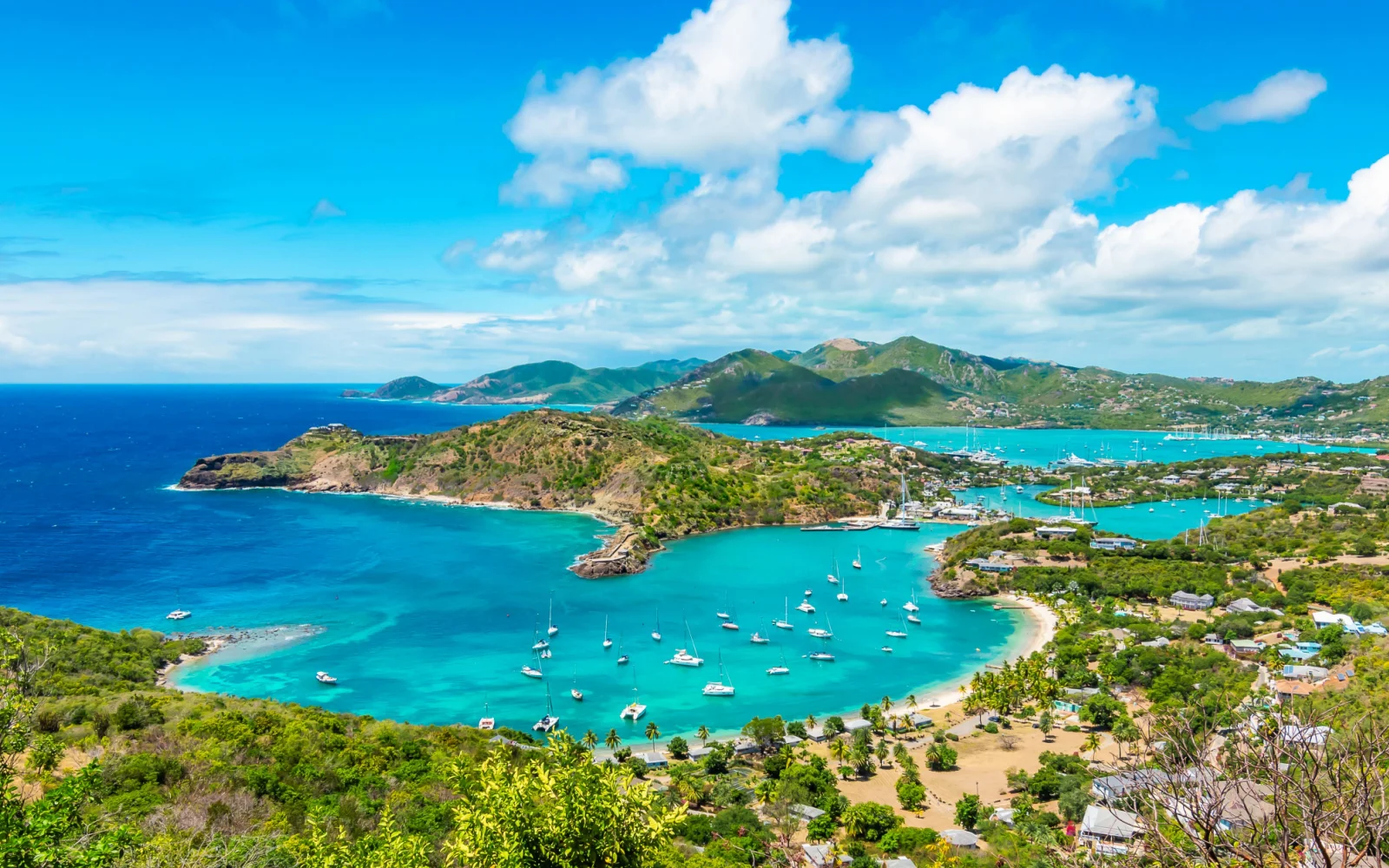Is Antigua safe to visit in 2024?
Antigua is generally considered a safe destination for tourists. The island, part of Antigua and Barbuda, has a relatively low crime rate, especially compared to other Caribbean islands. Most incidents involving tourists are of a petty nature, such as pickpocketing or bag snatching, and violent crimes against tourists are rare.
The island of Antigua, which is part of the country of Antigua and Barbuda, is a popular tourist destination for people looking for sun, sand, and surf. During peak tourist season, the island receives over 20,000 visitors monthly.
The beach is definitely the primary draw for visiting Antigua. The island has 365 beaches, all on the beautiful Caribbean Sea. Some highlights include the party beach Hawksbill, more remote Half Moon Bay, or Stingray City, where you can swim with gentle rays.
On shore, sample some local rum, explore the island’s history in the capital of St. John, or go on a family adventure to Antigua’s Donkey Sanctuary.
There is a surprisingly long list of things to do for this small Caribbean island, so you may be tempted to book your trip there immediately. However, there is always a small risk that you might be wandering into an unsafe situation when you go to an unknown destination, which is why research is important.
This detailed travel guide can help you prepare for whatever you might find when you visit Antigua. Keep reading for more information, including crime statistics and precautions.
Is Antigua Safe to Visit in 2024?
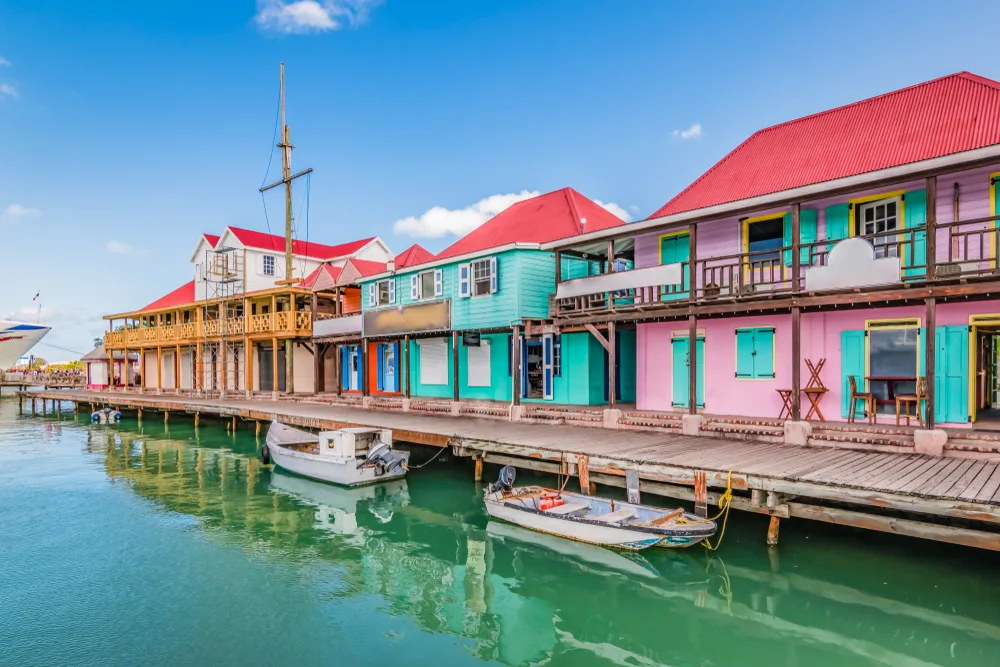
NAPA/Shutterstock
Yes. The island of Antigua is one of the safest choices you can find for your Caribbean dream vacation! The small island has a fairly low crime rate, especially when compared to other islands in the Caribbean. While crime does still occur, it rarely affects tourists.
Ready to Book?
Unlock Exclusive Discounts on Expedia.com!
Got Travel Insurance?
Protect yourself for unexpected interruptions.
Compare Plans We may be compensated when you book after clicking on one of our links.A good place to start researching the safety of Antigua is travel advisories for Antigua and Barbuda, the country this island belongs to. Most travel advisories from foreign governments agree that the island is safe to visit.
For example, the United States just issues a Level One travel advisory for the island country, the lowest level for travel advisories. Most world governments agree in their assessment that Antigua is a safe place to visit.
Canada also puts Antigua and Barbuda under the lowest possible travel advisory level, just telling its citizens to exercise normal precautions in the country. Of course, Antigua also has its fair share of problems. As in many other Caribbean destinations, crime does still occur on the island.
The most common crimes include:
- Pickpocketing
- Bag snatching
- Robbery
- Armed robbery
While most incidents that affect tourists are petty in nature, there have been violent crimes affecting tourists to Antigua in the past.
While the island is safer than many of its Caribbean neighbors, that doesn’t mean that it is quite a crime-free paradise. Another danger that might affect you as a tourist in Antigua is a natural disaster.
The most common natural disaster in Antigua is the hurricane. Antigua tends to get hit hard during hurricane season. In 2017, the island and its neighbor Barbuda were devastated by Hurricane Irma and Hurricane Maria.
Hurricane season in the Caribbean lasts from June to November and intensifies from mid-July to the end of September.
Avoid traveling to Antigua during this time since the likelihood of getting caught in a hurricane is fairly high. These storms can last for several days and cause power outages, flooding, and building collapses, so it’s best to be off the island then.
Crime in Antigua
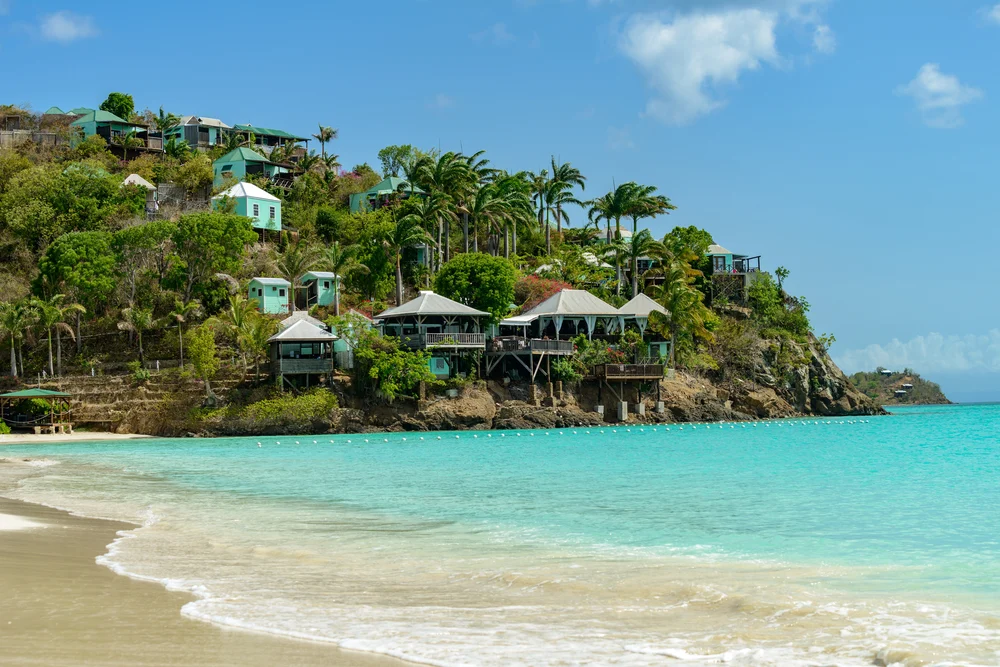
Jgorzynik/Shutterstock
Although Antigua does not have as high a crime rate as other Caribbean islands, it still struggles with crime. It is good to be aware of the possibility of crime before you go so you know what you need to protect yourself from.
Like many Caribbean islands, Antigua has a high rate of violent crime. The homicide rate alone is 17.2 incidents per 100,000 people. However, crime statistics often appear skewed because of Antigua’s small population.
The entire country of Antigua and Barbuda has about 93,000 residents. Although the island of Antigua contains the vast majority of these people, that is still a fairly small population.
When places have such small populations, calculating the rate per 100,000 people magnifies the impact of individual incidents. Antigua has fewer than this, so each homicide gets counted multiple times when calculating a rate per 100,000 people.
The homicide rate calculated per 100,000 people fluctuates wildly from year to year, showing that it is not the best way to get an idea of the crime on the island.
Another way to get an idea of the crime situation in Antigua is to look at what the locals say. According to Numbeo, Antigua scores a crime index of 70.83 out of 100, a high value.
Locals are concerned about corruption, drug abuse, and petty crimes such as pickpocketing and theft from vehicles. There are a few reasons why Antigua suffers from an elevated crime rate.
Many of these factors are the same as the ones plaguing other Caribbean islands. For example, Antigua is on the international cocaine smuggling route, and many violent crimes on the island are tied to international drug trafficking rings.
Antigua also has a problem with small street gangs and criminal syndicates that organize break-ins and robberies.
Due to weapons smuggling, it is now easier for these gangs to get guns, leading to an increase in violent crime. However, many of the problems don’t affect tourists visiting Antigua at all.
Most crimes in Antigua affect locals and occur in parts of the island where tourists (at least well-informed tourists) don’t tend to venture.
You should be aware of the risks when visiting Antigua and plan accordingly, but don’t let fear ruin your trip, as the likelihood that you will be the victim of a crime, especially a violent crime, is not that high.
Petty Theft
The crime you are most likely to experience in Antigua is the same as pretty much anywhere else — petty theft. Forms of petty theft, such as pickpocketing and bag snatching, are some of the most common crimes around the world because they are the easiest to get away with.
The Canadian government warns about the prevalence of petty theft in its travel advisory for Antigua and Barbuda, so it’s a good idea to keep an eye out for this crime when you visit the island.
Common forms of theft are pickpocketing and bag snatching. The precautions from theft that you should take in Antigua are the same as the precautions you might take anywhere else. Make sure that you don’t leave valuables unattended.
It’s common for visitors to Antigua to leave their phones and wallets on the beach while they go swimming, which is a bad idea because thieves often rifle through unattended bags.
As you’re walking around Antigua, for example, in the capital St. John, invest in a bag that is difficult to snatch, such as a cross-body bag.
Loose bags with no zippers or shoulder purses are easy to reach into and to grab, making it easier for thieves to take your things. However, avoid fanny packs and money belts, as those single you out as a target and tell thieves exactly where your valuables are.
Many tourists choose to rent a car in Antigua to get around the island since public transportation is not the greatest. Keep in mind that rental vehicles are often targeted for thefts and break-ins.
Never, ever leave valuables in the car, even if you are just stepping out for a few minutes to get gas.
Try not to leave anything visible in the car, as your shopping bags or spare change could attract unwanted attention. With these basic precautions, you can avoid being the victim of a crime.
Robbery
Violent incidents do happen against tourists in Antigua. Most violent crimes that affect tourists on the island are forms of robbery.
The UK government warns about the potential for robbery and some other violent crimes in its travel advisory for Antigua and Barbuda. It also offers advice for travelers to avoid this crime risk.
The primary advice to follow to avoid a robbery is not to wander around at night. Criminals wait to take advantage of tourists, who are often alone and drunk, after dark.
If you decide to explore the island after dark, make sure that you are with a group of trusted people and that you stick to well-lit areas with plenty of other people enjoying the evening.
Avoid poorly lit side streets, deserted residential quarters, and especially beaches, as beaches are often mugging sites. Armed robberies often happen in the form of break-ins, so make sure that your accommodation is secure.
Research the place you are staying ahead of time to find out what safety precautions they take. Many hotels have private security features. A homestay may be less safe.
The UK government mentions in its travel advisory that robbers often target passengers on yachts since Antigua is a popular stop for people yachting the Caribbean. Research docks ahead of time and make sure that you are docking in a secure area.
Avoiding Bad Areas
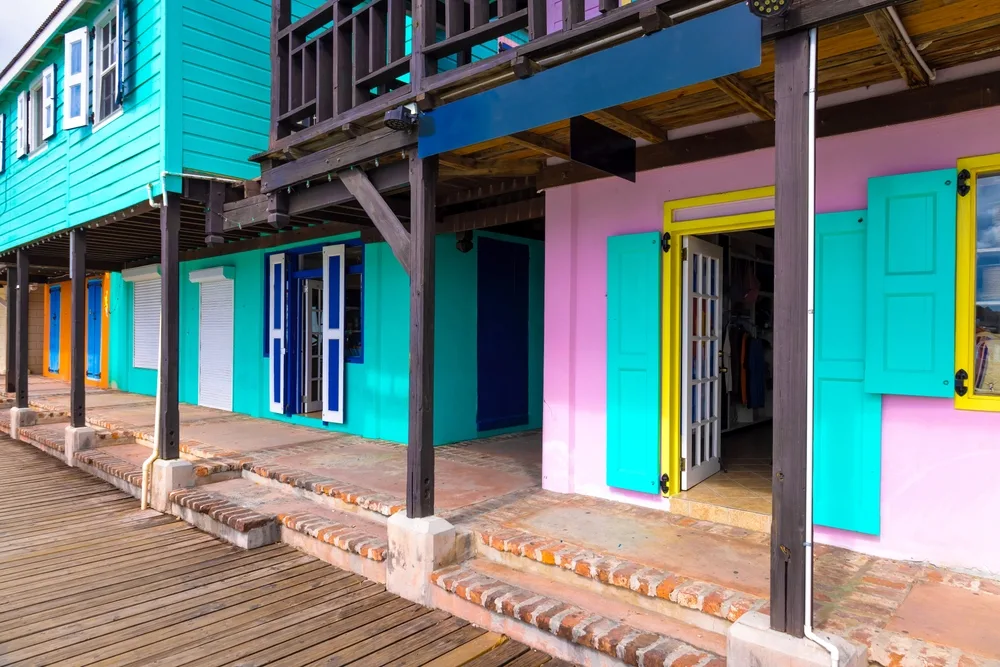
Eskystudio/Shutterstock
Avoiding bad areas is key to staying safe in Antigua since some parts of the island have much higher crime rates than others. The capital St. John has a few dangerous neighborhoods.
These include:
- Market Street
- Heritage Quay
- Redcliffe Quay
Your instincts can tell you which neighborhoods are safe or not. If you don’t feel completely safe, focus on getting out of the area immediately.
Avoid isolated beaches such as Carlisle Beach unless you are traveling with a group. While these beaches are great for swimming without crowds, they also tend to attract thieves and robbers.
Frequently Asked Questions
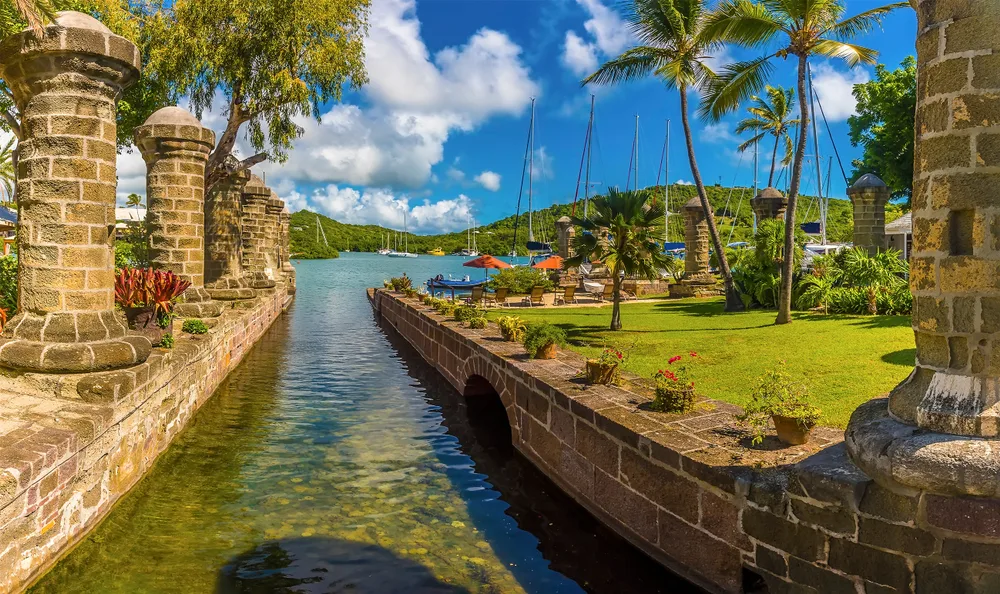
Nicola Pulham/Shutterstock
Here are some common questions other visitors have asked before visiting Antigua:
Is it safe to walk around Antigua at night?
Antigua is not very safe at night, so it’s best to limit your explorations of the island to the daytime. The rates of robberies and other crimes increase at night. Antigua doesn’t have a great nightlife anyway, so there’s not much reason for you to wander around at night.
Is it safe to travel to Antigua right now?
Yes, it is safe to travel to Antigua right now since the COVID-19 pandemic is no longer affecting the island, and the crime rate is stable. Just make sure that you don’t go during hurricane season.
How safe is the island of Antigua?
Antigua is a relatively safe Caribbean island with a much lower crime rate than many of its neighbors. However, it still has a high crime rate for its population.
When should I avoid Antigua?
Avoid Antigua during hurricane season, which is from mid-May to November. Storms can grow into hurricanes at any minute, and you don’t want to be trapped on the island during a storm.
Is it safe to swim in the sea in Antigua?
Most beaches in Antigua are safe to swim in, but some have strong currents and are not always well-marked. Ask locals for advice, and don’t swim out too far.
So, Is Antigua Safe to Visit?
While there’s a relatively high crime rate on Antigua, it’s actually much safer for tourists than you’d expect, as the numbers are skewed by the small population.
So, with so much to see and do and a save environment overall, what are you waiting for — book your trip today and experience for yourself all that Antigua has to offer. Happy travels!



